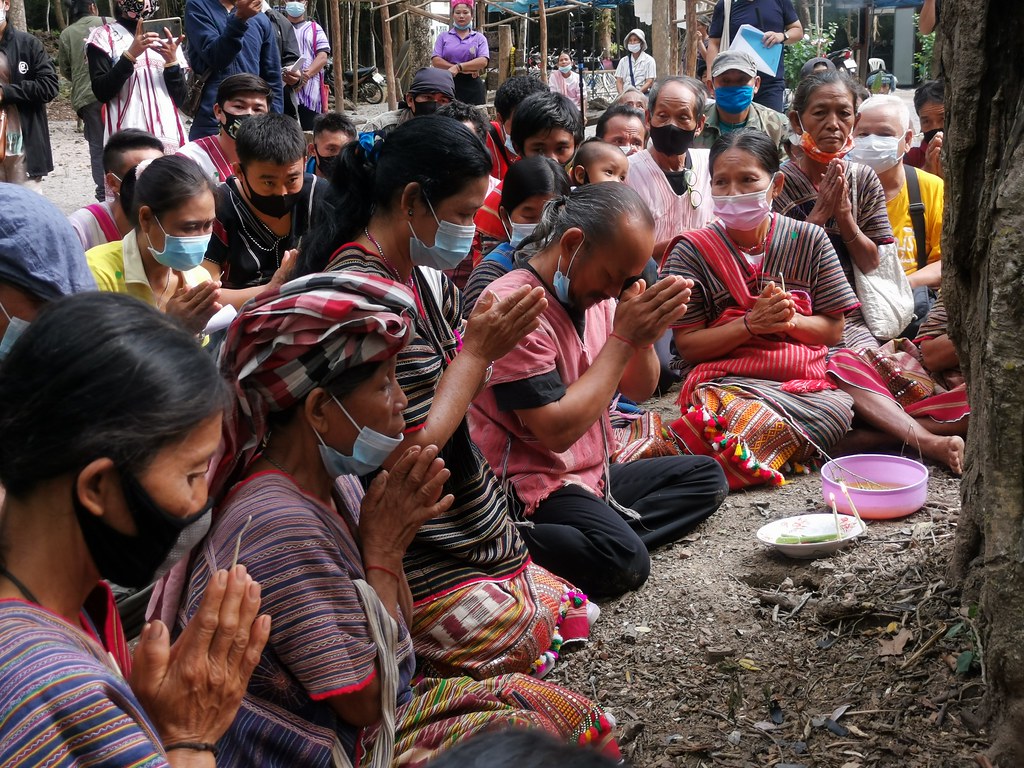UN human rights* experts urged the UNESCO World Heritage Committee to defer Thailand’s bid to get a prized heritage listing for the Kaeng Krachan Forest Complex, saying the indigenous Karen are being subjected to rights violations in the park.

Members of the Karen communities holding a traditional ceremony to inform the spirits that the event is being held before a discussion on community rights issues on 16 December 2020.
The World Heritage Committee will review the nomination on 26 July. The Committee has previously twice rejected Thailand’s push to get heritage status for the park in 2016 and 2019.
“This is an important precedent-setting case, and may influence policies on how indigenous peoples’ rights are respected in protected areas across Asia,” the experts said.
“The indigenous Karen in the national park continue to be forcibly evicted and their houses burnt. A key leader was killed after being detained by national park officers. In 2021, harassment of the Karen has escalated and over 80 community members were arrested and 28 of them, including seven women and one child, were criminally charged for ‘encroachment’ on their traditional lands in the national park.
“There has not been good faith consultations with the community allowing them to participate in the UNESCO nomination process. Should the nomination as heritage status be approved it would perpetuate the denial of the Karen’s right to remain on their traditional lands and carry out their traditional livelihood activities based on rotational farming. It would also undermine their important role in safeguarding biodiversity in the forest.
“The Thai Government needs to stop the harassment of environmental defenders and establish a genuine dialogue with the Karen, recognise their valuable role as guardians for protecting nature, and work in partnership with the Karen rather than treating them with hostility as if they are a threat.”
Independent monitors have been denied access to the park, which borders Myanmar, by the Government. The International Union for the Conservation of Nature has clearly advised against the approval of the nomination of the park until the concerns have been fully addressed, the experts said.
“We have raised concerns repeatedly with the Government of Thailand and the UNESCO World Heritage Committee since 2019 and now it is really time to ensure that they step up to their obligations to protect indigenous peoples,” they said.
“We are particularly concerned that the UNESCO World Heritage Committee has adopted commitments towards indigenous peoples on paper but in practice does not have working methods that allow indigenous peoples to participate effectively and have their voices heard in the nomination process.”
‘We call on all 21 States that form part of the World Heritage Committee to assume their responsibility to respect and protect the rights of indigenous peoples in nominations for heritage status. The decision on Kaeng Krachan must be deferred until the concerns have been fully addressed by the Thai Government and independent monitors have been given access to the park.”
The Special Rapporteur on the rights of indigenous peoples, Francisco Cali-Tzay, reiterates his willingness to undertake an official country visit to Thailand and visit the national park to assess the situation.
* The experts: José Francisco Cali Tzay (Guatemala) is the Special Rapporteur on the rights of indigenous peoples. He is Maya Kaqchikel from Guatemala, with experience in defending the rights of indigenous peoples, both in Guatemala and at the level of the United Nations and the OAS. He is a Lecturer in Law at the University of Arizona.
David R. Boyd (Canada) is the Special Rapporteur on human rights and the environment. He is an Associate Professor of law, policy, and sustainability at the University of British Columbia.
Mary Lawlor (Ireland) is the Special Rapporteur on the situation of human rights defenders. Ms. Lawlor is currently an Associate Professor of Business and Human Rights at the Centre for Social Innovation (CSI) at Trinity College Dublin Business School.
The Special Rapporteurs are part of what are known as the Special Procedures of the Human Rights Council. The Special Procedures, the largest body of independent experts in the UN human rights system, is the general name for the Council's independent investigative and monitoring mechanisms that deal with specific country situations or thematic issues in all parts of the world. Special Procedures experts work on a voluntary basis; they are not UN staff and do not receive a salary for their work. They are independent of any government or organisation and serve in their individual capacity.
Prachatai English is an independent, non-profit news outlet committed to covering underreported issues in Thailand, especially about democratization and human rights, despite pressure from the authorities. Your support will ensure that we stay a professional media source and be able to meet the challenges and deliver in-depth reporting.
• Simple steps to support Prachatai English
1. Bank transfer to account “โครงการหนังสือพิมพ์อินเทอร์เน็ต ประชาไท” or “Prachatai Online Newspaper” 091-0-21689-4, Krungthai Bank
2. Or, Transfer money via Paypal, to e-mail address: [email protected], please leave a comment on the transaction as “For Prachatai English”
